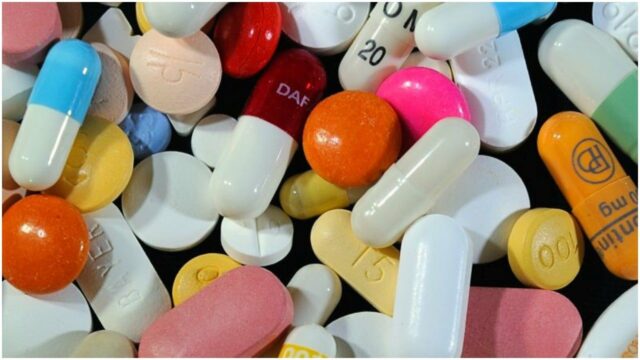People in the habit of swallowing drugs without water would have to put an end to it as pharmacists have warned that such an act is not only harmful but will make the drugs less effective.
The pharmacists also said that it was wrong for people to chew drugs that were designed to be swallowed; stating that such a habit would affect the efficacy of such drugs.
The pharmacists who spoke during interviews with PUNCH Healthwise urged Nigerians to avoid the irrational use of drugs which they noted was associated with health hazards.
According to them, irrational use of drugs is not only a waste of scarce resources that could otherwise be spent on other essential services but also leads to drug-induced disease.
They, however, said it was imperative for medical practitioners and other health professionals to give adequate time to patients and to explain some basic information about the use of drugs.
Speaking with PUCH correspondent, a community pharmacist, Dr. Samuel Adekola, said that people should take drugs based strictly on instruction from a pharmacist.
Adekola, who is a former National President of the Association of Community Pharmacists of Nigeria, said, “Swallowing of drugs without water affects their dissolution in the stomach as well as their absorption in the small intestine, thereby making them less effective.
“The essence of using water to swallow drugs is to ease transportation to the stomach, where they will dissolve; and then to the small intestine where the absorption takes place.
“The pH of the stomach is acidic, so, there are certain types of drugs, such as septrin, that require plenty of water when taking them. If you swallow drugs, particularly capsules, without water, you run the risk of the drug sticking to the throat and it can cause choking.
“Apart from water aiding transportation of drugs to the stomach, failure to use water to swallow drugs affects their dissolution in the stomach and this can create another health issue.”
The pharmacist also stated that chewing tablets without water had implications, though “we do have chewable tablets.
“Now, when you chew without water, the drug will just disintegrate, rather than dissolve.“So, it has to still be transported to the stomach with water where the proper dissolution will take place. The dissolution of the drug will be hampered if not taken with water.”
He warned that if the drug is not dissolved, it cannot be absorbed, saying, “Drugs depend on water for dissolution.”
The pharmacist said that after chewing the drugs, some quantity, however small, will be left in the mouth, and at the end of the day, you are not going to have a total component of the drug delivered to the stomach.
“It is only the quantity that the saliva can push to the stomach that will be available for absorption. This can affect the efficacy of drugs and the patient may not get the full concentration,” he warned.
Adekola said that naturally, every drug has a percentage that should get into the system for it to be effective. “If drugs are stuck in the mouth after chewing, some percentage of the drugs will not get to the stomach where they are supposed to be absorbed,” he enthused.
Experts say for several reasons, some tablets shouldn’t be crushed or chewed, as doing so may result in dose dumping — that is when the body very quickly absorbs a large amount of a drug.
One consequence of dose dumping is an overdose of the drug, which can lead to death, according to experts.
Adekola said that the risks of chewing drugs are more prominent with certain enteric-coated drugs that usually cause problems when they get to the stomach.
“If they get to the stomach, they tend to create problems like ulcers. Such drugs include aspirin.
“Sometimes, one of the ways that they are being formulated is to make them enterically coated. What that means is that they are protected and shielded from the stomach acid. So, they are allowed to only disintegrate after they leave the stomach.
“When you swallow them, they will not dissolve in the stomach compartments; rather, they will be transported down to the small intestine before the dissolution takes place. That way, you will overcome the side effects of induction of ulcers.
“Now, if you chew them even though they are bitter, you are aiding their disintegration and dissolution, thereby increasing the chances and degree of their side effects,” he said.
Adekola advised patients to be rational about drug use and to always take drugs according to prescriptions and instructions from healthcare professionals.
Also speaking, another community pharmacist, Mrs. Biola Paul-Ozieh, blamed the irrational use of drugs on unrestricted access to medicines which she added contributed to the increase in drug abuse among teenagers in the country.
She said, “Parents and guardians have a role to play in ensuring that young Nigerians do not abuse drugs because it predisposes them to chronic diseases. They should ensure that all medicines are bought from pharmacies with the ‘Green Cross’ pharmacy emblem where they will be guided on the usage.”
Meanwhile, Sheila Rivera, a pharmacist with Sharp Rees-Stealy Medical Centres, United States, and her pharmacy student, Trexie Olivar, warn that ‘dry swallowing’ medication can pose a potential choking hazard, and that there are other dangers to this practice that people might not even realize.
“A pill making contact with the lining of the esophagus — the muscular tube that connects your mouth to your stomach — may cause tissue damage and inflammation,” Olivar stated in an online platform, Sharp Healthcare.
This may cause difficulty swallowing, bleeding, heartburn, or chest pain, which may lead to more complications if left untreated.
Almost any kind of drug can be harmful if not swallowed correctly, but Olivar pointed out that pain-relieving medication such as aspirin and ibuprofen; supplements such as potassium chloride and vitamin C; and some antibiotics are among the worst culprits.
Rivera and Olivar recommend drinking a full 8-ounce glass of water when taking medications. Olivar said a full glass of water is best because taking just one or two sips can also cause harm.
“Not drinking enough water may also cause throat irritation and, in some cases, prevent medication from working properly,” she added.
Copyright PUNCH









